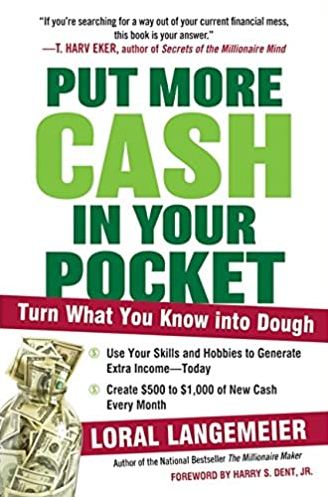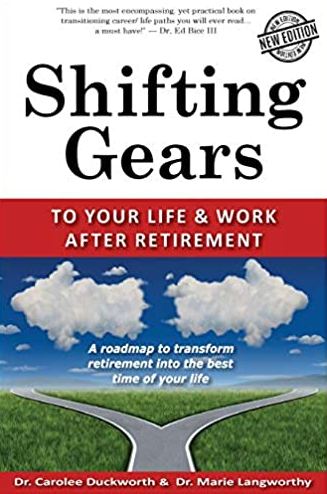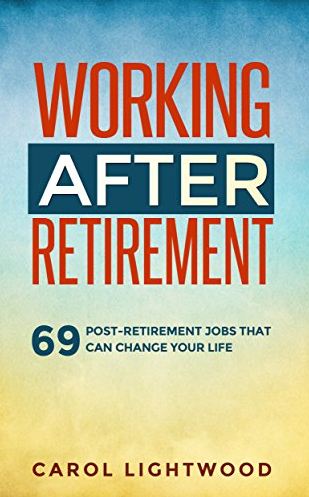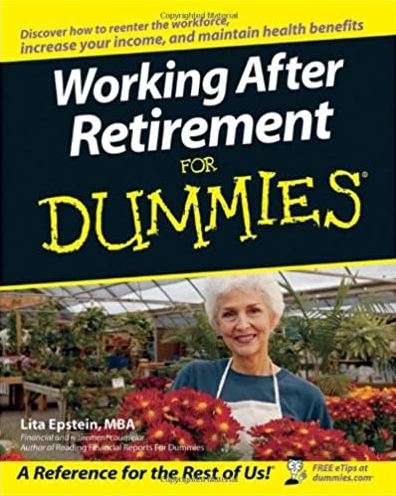Part-time or full-time work after retirement is something many folks are looking to do. Plus, their post-retirement work plans don’t necessarily have to follow the same thing they were doing before. Some might be looking for ways to earn extra money, but they may be having a hard time coming up with new ideas. Other people want to work out of the home; but the home-based option seems to be more popular these days.
If you or someone you know is facing such a dilemma, there are several ways to make the situation easier. Below, we’ll discuss some of the steps you can take and some books to read while deciding about your work after retirement:
Put More Cash In Your Pocket, by Loral Langemeier
‘Put More Cash In Your Pocket’ is possibly one of the most valuable books about extra income ideas. It also fits right in with the idea of work after retirement.
The specific goal of this book is to make extra money fast — to launch your idea and get the first payment, all within 30 days. The goal in the book is to make $500 to $1000 extra per month in new cash. If you can put in more than part-time hours for work after retirement, your income goes up. What’s more, you get to use skills, knowledge or hobbies you already have, “with a twist,” as the author says. There are also a couple of pages full of ideas in the book to get you started. Here are some hobby activities for seniors to spark some ideas.
This small, easy-to read book is complete with very specific to-do steps, charts, worksheets, etc. The author gives precise details about how four very different people made new income doing very different things (including power washing) within 30 days. She also has several other ideas that are excellent for work after retirement, such as a dog walking business.
For instance, at $15 an hour for dog walking, walking three dogs a day Monday through Friday will make you an extra $1000 per month. Cut that in about half if you want to work less and make $500.
Other miscellaneous work ideas include tutoring, fixing computers, catering, cooking lessons, teaching music, desktop publishing, bookkeeping, fitness instruction, foreign language lessons, odd jobs, and so on.
Shifting Gears to Your Life and Work After Retirement by Dr. Carolee Duckworth and Dr. Marie Langworthy
This is a book for those who are about to retire, forced to retire, or have been retired for some time. The information in these pages is geared towards clearing up confusion and helping the reader to achieve their ideal path after retirement.
Even if extra income isn’t your top priority, it’s critical to understand how your life after retirement can still give you mental stimulation, social connection, purpose, and a feeling of reliance. Overall, this book will help to define and pursue the path that can suit your skills and fulfill your goals.
Inside this work, there’s a 10-point countdown to help us let go of the past and a five-step process to help us create an exciting new life after retirement. There are also several categories of work outline for the reader to consider. Last but not least, there’s a wealth of websites that can help a retiree get started on their new journey.
Working After Retirement: 69 post-retirement jobs that can change your life by Carol Lightwood
Since the author of this book is retired herself, we may expect a lot of knowledgeable insight on the subject of working after retirement here. She talks about age discrimination, where to start working, and several kinds of jobs that don’t require re-training.
There are several inspiring examples in these pages as well, most of them about retirees who are doing well by following the ideas in the book. Most of the jobs mentioned are either part-time or home-based, which would work best with senior citizens.
Working After Retirement For Dummies by Lita Epstein
This book is a friendly guide for any retiree who wants to be part of the workforce again. With most of the boomer generation facing healthcare and financial issues, it’s logical to have a fairly simple guide for such folks. The guidance here will include how one can search for a new job, overcome myths about employers, and how career options can be quite flexible in modern times.
The pages here also talk about nontraditional ways to get a job. The information is valuable even if you’re just looking to volunteer after retirement, write a resume, or pursue different career options than before.
How To Plan
Before you start on an idea, you have to decide how much you need in extra income per month when you work after retirement. Divide this by four, and you’ll know how much you need to make per week. From there, you can figure out how much you’d charge per hour so that you’ll know how many hours you’d be putting in per week.
You might also want to consider how to duplicate something that is out there instead of reinventing the wheel; at the same time, it’s important to be unique. For example, you might offer creative writing classes and hold a story-writing competition after some sessions. When you really get into it, you may actually find it possible to work a bit more than you initially thought. This will bring in more money and may also make your daily routine more interesting.
In a nutshell, besides deciding how much money you want to make, how much time you can put in with work after retirement, and which skills and interests to utilize, you also need to know about the following:
- What others with similar work are doing
- How much they charge
- Pretend you’re a customer, or research online
- How to just duplicate what’s already successful
- How much you will charge
- What you can do to improve or stand apart
- How to then charge a little more
- Who your market really is
- What start-up costs you may have, if any
- How to organize and schedule
- How you are going to get customers/clients
- Keep it simple; don’t overwhelm yourself or you won’t start
These are some of the specifics that all work involves. They apply whether you’re thinking of working form or having an external setup.
Work Ideas
The following are different types of extra income ideas carried out by actual people. All these people are doing what they know how to do, so we might be able to learn from their experience:
- One individual is a hair stylist. She works at the salon part time, and decided to get her license to do hair at her own home. Now, she also styles at the nursing homes and assisted living nearby; plus, she goes to people’s homes. She’s making as much as she does in the salon.
- A retired man has been doing metal detecting for several years. He says that he finds all kinds of items (he does find actual money, but also items he could sell, including jewelry). He always took his metal detector along while traveling, and made quite a nice little income on the side. Plus, he got outside and got some exercise.
- A retired farmer wanted to work after retirement, and specifically wanted to continue his experience with animals. So he got a job at a local zoo working at their baby animal barn and teaching visiting kids (and adults). In fact, he talked the zoo into expanding their program to accommodate what he wanted to do!
- A former boss got laid off, but instead of panicking, she decided to do what she’d always wanted to – have a dog walking service. She has a steady clientele, walking their dogs and doing pet sitting, and has never been happier.
- A gentleman who retired from the Air Force also had basic bookkeeping skills. So, his work after retirement involved doing bookkeeping and taxes for several steady clients. He brought in a very lucrative additional income.
The Advantage of a Professional Background
It seems like people who have had a professional background in accounting, finance, business, teaching, nursing, and even law have a relatively easier time extending the same work into part-time retirement jobs. These jobs might even be conducted from their own home. Below are just a few examples:
- A nurse realized the great need for seniors to receive basic foot care. Most such individuals needed this service in their homes. She hence established a routine service, including toenail and fingernail cutting, a basic foot check, plus a bubbly foot bath (in a small electric model that she carries with her), and a foot, leg, and hand massage with lotion. One session takes around 35 to 40 minutes of her time. Since Medicare no longer covers this service with a podiatrist, her business has virtually exploded. She can make one visit to one senior building, and do several people in one day without traveling anywhere else. Now her mother, also a nurse, is helping her do the same work after retirement.
- A woman began a miscellaneous and errand service business — this included running, organizing, house cleaning, and even helping people to move. She soon had a thriving business, expanding services as people inquired. Her husband joined her, doing basic repair work, painting, and small construction projects.
- One retired lady who loved babies and began taking care of infants in her home, just one at a time. She began to work after retirement for someone she knew. When that child was ready for preschool, word spread that she did infant care and had an opening. She was never without a client.
- A person got laid off from his management job but wasn’t ready to “retire” yet. He was really good at painting the interiors of houses as well as basic construction and handyman work. Job hunting in his field was almost pointless and he needed to do something. He launched his new business and now makes more than he did before. To get the word out, he did a couple freebies for friends, got some referrals and gave a discount, got more referrals, and also passed around flyers in the neighborhood. He was good, efficient, and cost less than his competitors.
- A worker who retired from her office job placed an ad in some college papers and hung notices on their bulletin boards about her typing, editing and proofreading skills. Her work after retirement is making her a nice little income on the side.
- A woman who had a background in working with seniors began her own business doing home services for the elderly. She did their errands and shopping, took them to appointments, and did a little housekeeping. She served as a companion as well, reading, baking with them, watching movies, doing activities and/or crafts, helping with a little exercise, having coffee, etc. She was a certified aid, but many of these activities required no certification. All it took was a little love and a helping hand. If this seems like a likely option for you, check out some fall crafts you can do with the elderly.
- One individual had been in the corporate world forever. Upon retirement, he set up a small engine repair business out of his garage. People would regularly bring their lawnmowers, snow blowers and weed whackers for service and repairs. He usually had complimentary coffee there, along with lots of good conversation too. During certain seasons, his work after retirement became pretty much full time.
- Someone who was already familiar with appliance repair, took a course to further enhance his skills and set up a thriving business. He coupled this witha little handyman work on the side.
- Another woman in town set up a small business as a seamstress in her home. She did alterations and specialty sewing and always stayed busy. Eventually, she also ended up doing some costume design and sewing work for the colleges in town.
- A retired individual had a small yard service business. His rates were reasonable, and he loved being in the outdoors and getting exercise. In the winter, he also did a little snow blowing. His wife also did seasonal gardening and started working in the local gardening nursery.
- One man drove the activities bus for the local middle school and high school. He was the bus driver on field trips and for sporting events with the teams. He loved the work, got to see the games, and became good friends with many of the kids and their families.
- Another person became a tutor for children after school, especially in reading. She was excellent with a particular learn-to-read program based on phonics that really worked. Word spread fast, as the parents were so thrilled with the outcome. In time, her work after retirement was making her much more money than anticipated.
- Two musically talented people who have put their skills to work after retirement. One teaches music lessons (piano) in his home, but sometimes in the client’s home too. He also made arrangements with the local music store to be their piano instructor as well. If one of his students ends up buying a piano, he gets a commission.
- A piano teacher also retired and started teaching lessons on the side. This works for any kind of instrument. Teaching music can be really good work after retirement, usually bringing in about $25 per lesson.
- Another musically-inclined guy, who’d been in an unrelated sales job for many years, joined a band after retirement. Now he and his friends have steady gigs around town. He can play drums or guitar, and has also been asked to be a substitute player for other bands when they need someone.
Creative Skills
Speaking of creative, if you know anyone with a daughter who loves American Girl (or other) dolls, you’ll know their wardrobes can be a bit expensive. Making doll clothes and accessories can be very successful.
A retired person who’s good at sewing can start making clothes for American Girl dolls as well as many other kinds. They can also add something extra to make the items stand out. Offering customized services is also a great way to satisfy customers and make even more money with the same amount of time and effort.
If you’re an artist or crafter, doing the craft shows can provide some really fun work after retirement. One woman specialized in making stuffed snowmen out of (used) white chenille bedspread fabric. She made many at a time, assembly-line style. Soon, she had a respectable following and demand for her wares. After about three years, (with a new collectible snowman or woman character each year) she was making thousands of dollars in profit… for a few months of work and shows. Eventually, her husband started helping her. They got a business name and tax ID number, and so were able to buy all supplies wholesale.
If you don’t want to do the craft shows, consider selling your creations online at etsy.com — specializing only in hand-made items of all kinds by artists and crafters. People do very well selling on this site.
A Few More Examples
If you’re still looking for work ideas after retirement, here are some more examples. Remember, your skills are probably in demand and that hobby just might earn a much-needed income:
- If you are skilled in sewing, consider working in a fabric store or teaching beginner sewing classes.
- Your local craft store might hire retired people to teach a variety of classes.
- Cake decorating is always in demand, so look around for potential clients who might pay top dollar for some unique work.
- Teach computer skills (to any age group, including seniors) at a local community ed center. Community ed provides great opportunities for work after retirement, and classes run in cycles throughout the year.
- Likewise, teach a foreign language (or any other skill or craft you may have).
How To Get The Word Out
How did all of these people start their work after retirement? Basically, it’s a combination of doing a few freebies or generously discounted services for friends to get the ball rolling. From there on, the friend gives referrals who get a nice discount. Their referrals also get a discount (but not as big).
You may also see new entrepreneurs handing out business cards or half-sheet announcements (which are bigger than cards so they don’t get lost) wherever they go. Hanging flyers and passing them out door-to-door (grandkids can do this too) might also work. You can also try just approaching the people you want to work for.
If you’re serious about doing some work after retirement, make sure to read at least one of the books mentioned above. You’ll get a lot of guidance and might even be able to chalk out some definite steps for the near future.
Other Employment For Seniors
There are, of course, employment agencies who do specifically work with seniors. Perhaps you still are interested in working from home, but don’t want to start anything yourself. In such cases, the following options might be more attractive than self-employment:
- Online call center work – You may have heard of working from your computer for an online company, such as those who offer call center services to clients (and you’d be a member of the call center staff from home) do your research.
- Typical companies that do have good Better Business Bureau ratings are Alpine Access, Convergys, Liveops, and Arise, and there are others. You really can work for them from home. But do the research first. You can do a BBB search at search.bbb.org. But remember, getting a good BBB rating is not the same as getting a good employee rating!
- Freelance computer work — There are reputable opportunities available in which you get to choose the jobs you want to bid for and do, such as typing, website design, graphic design, writing, editing, sometimes even accounting. Some of the more well-known companies that offer such opportunities include mturk.com, freelance.com, elance.com, odesk.com, guru.com, etc.
If you’re thinking about working online, stay alert; there are a lot of work-at-home scams around. Some pay very little, have stressful methods of rating employee work, and little management support.
Other companies might require you to put money down for “training,” and then you get very little work. Or no work, they’ve already taken your money. Others just want you to fill out an application so they can get all your personal information. Be careful about these scams; they’re pretty common but you can recognize them soon enough.
Conclusion
It’s a known fact that when we keep busy after retirement doing something interesting and fulfilling, we keep our mental faculties sharp. Working is good for the brain, and it’s good for the pocketbook as well. Make sure to read up on our effective retirement planning guide while you’re thinking about your post-retirement career.












